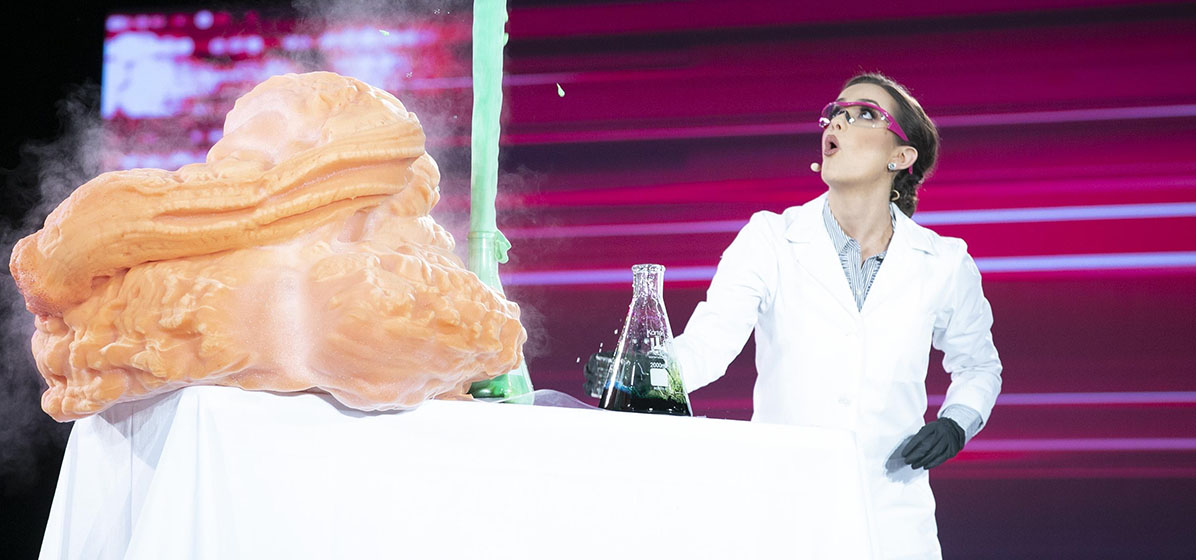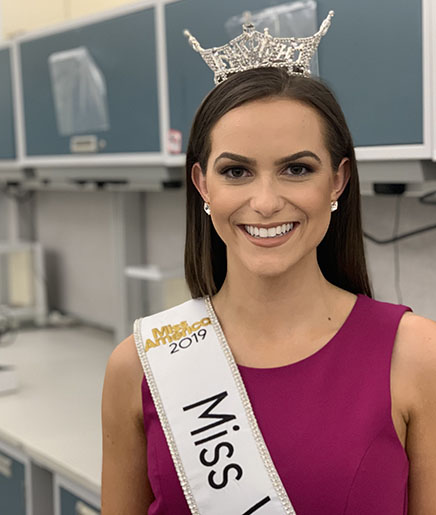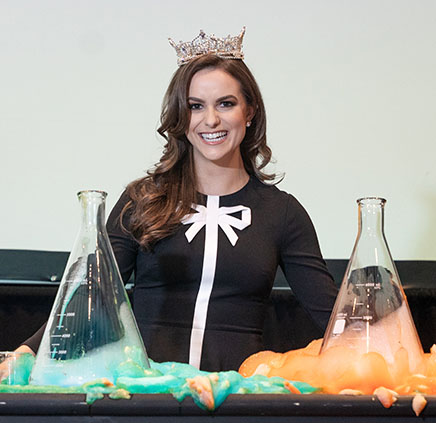
Catalyst for Change
Camille Schrier on Miss America, the pandemic and how it feels to be the world’s most famous pharmacy student.
Interview by Greg Weatherford
In 2019, Camille Schrier, a rising second-year PharmD. student at the School of Pharmacy, entered the Miss Virginia competition on a whim — and won. In December of that year she was crowned Miss America, thanks in part to her science and health platform capped with her dramatic presentation of the catalytic conversion of hydrogen peroxide.
The 2018 Virginia Tech alum (cum laude, with degrees in biochemistry and systems biology) paused her P2 year to fulfill her duties to the organization, with appearances on national news programs and hundreds of speaking engagements across the country. When the COVID-19 pandemic struck, canceling the 2020 competition, Schrier’s tenure as Miss America was extended through 2021 as “Miss America 2020.” We spoke with her a few months ahead of her return to pharmacy school.
SoP: You have been such an incredible ambassador for pharmacy and science.
CAMILLE SCHRIER: Thank you. It's broken stereotypes on both sides. The science world is like, "Wait, this girl is going to go and do what? She's going to do a pageant?" It's a little bit nontraditional for a woman of science to go out and do this traditionally feminine beauty pageant.
And in the Miss America world, it's very untraditional to have someone come in with science being the thing that they're presenting as their talent. So I kind of broke two stereotypes at the same time, which was wonderful. What I started to realize was how refreshing that was to people and to schools, to parents, to people looking for an adult female role model for their young girls and boys.
When I put that crown on my head and I go out, I expect people to be like, "Are you Miss America? Are you Miss Universe?" That happens. But I often get asked, "Are you the science girl?" When those moments happen, I feel like I've done my job.
The pharmacy community has been so thrilled by this because many people don't understand what pharmacists do. I frankly didn't understand what pharmacists did until I really applied to pharmacy school.
Has this experience changed the way you view your role in health care and pharmacy in particular?
I joke that this job has been a paid internship. The social issue I focused on [medication safety and the opioid epidemic] is pharmacy-related, so the work I got to do was pharmacy-related. I got paid in scholarship money to literally advance what I was already doing in the classroom. I feel very lucky to be able to do that.
The work that I've done on misuse of prescription medications and the opioid epidemic, wanting to ensure that pharmaceutical companies are acting with the deepest integrity and ethics that they could, that's just given me a very different look at the industry as a whole. I think it's affected the way I'm going to function in my pharmacy career. I feel really lucky that I got the chance to have this experiential learning while I'm in school.
I have always wanted to be in a pharmaceutical industry. When I think about potentially what my role in a pharmaceutical company might be, understanding the issues that people have in access to medications, prices of medications, I do think that it's changed my perspective.

What lessons will you take with you?
I've realized through this that it's impossible to please everyone. And if you try, you're going to set yourself up for failure. I think that is applicable not only when you're serving in a public role but in the workplace. You're not going to be able to make everybody happy at all times.
Another lesson has been, I grew up and got my education in a kind of a rural/suburban, generally affluent community. I had not really had the experience to be in communities that were different from mine when I grew up. I grew up in suburban Philadelphia. I went to a private school. I went directly to college and then went directly to grad school.
As Miss America I was in communities that didn't have certain resources, people who didn't have the same kind of medical care, areas that didn't have internet access — things that I just didn't fully grasp were part of our communities, in Virginia and across the country.
I already knew about this, I’d heard about those things. But it’s a very different thing to walk into that school and meet those kids. As someone going into a health care profession, it has given me a very different perspective than I ever had prior to being Miss Virginia or Miss America.
How did the pandemic affect your time as Miss America?
There were two sections of my Miss America experience: pre-COVID and COVID. Pre-COVID, I was probably on a plane every other day and I would change cities, probably changing hotels almost every evening, so I was used to packing up my suitcase. ... Coming into the hotel room, getting my stuff out for the next day, repacking my suitcase so that in the morning all I had to do was put on my clothes and go basically. That became the normal routine for me.
For three months I would change cities. I was constantly doing events throughout the day. Let's say I'd go for an event and in the morning, I would do a speaking engagement. Maybe there was a cocktail party in the evening. I was going to a lunch with whoever brought me there. Then I would do that every single day with a few off days during the week.
I think I went home three times in three months. Maybe four or five times total. I would sometimes be home for eight hours — land in Philadelphia, go to my house, switch my stuff, go back to the Philadelphia airport and go somewhere else. That was exhausting, because I do have a genetic disorder and just also from a general human perspective. It was exhausting.
I had a booking manager who put everything on my calendar. I probably did 200 events, more than that, throughout my process as Miss America, in addition to other projects that I was working on like that TV show that I did.
I remember in the beginning asking, "How do I do laundry?" They're like, "You don't do laundry." OK, I'm not stupid. I know that you have to do laundry at some point. I'm Miss America, right? I can't wear the same outfit every day. The answer was a lot of women would have their parents ship them clothes on the road and then ship back their laundry. Or you would just acquire new things. Clothing sponsors would ship clothes on the road.
And when COVID hit?
Out of nowhere, I was on this last trip in South Dakota and everyone is like, "There's this virus." I was like, "Virus? Sure." We've had this happen so many times, right? There have been so many different viruses that were a thing. Then I remember landing home on March 13 of last year and I didn't leave until July. I went from not being home to only being home.
That was probably needed at the beginning because I was so tired. I don't know how I would have maintained that pace throughout the entire year. I'm sure I would have somehow but it's hard to even imagine.
At first it was like two weeks to stop the spread. Two weeks turned into four, then turned into months. Once COVID kind of settled down, I would probably do one or two days doing production of videos, like that cooking up science with Miss America show that I did.
The other maybe three days in a work week were primarily Zoom days and writing days. Answering emails, doing a lot of nonglamorous sitting on my computer writing shows, coming up with presentations. I was still giving a lot of speeches virtually.
A lot of people ask me if I was disappointed with my experience. A lot of women dream of this Miss America experience where they get to have the glitz and glamor of being on red carpets and all of that. I felt like I got to have a normal life and then do some stuff during the day and then just go back and be myself.
You were in the Macy’s parade!
I was excited to be able to see it but it was a COVID parade. They wanted to keep us in these vehicles because they didn't want us to spread virus. It was cool, though.
I got the real parade experience when I did the Rose Parade in California. That was incredible and exhausting at the same time because it's so long. It was probably five and a half miles. It took almost three hours to do the whole parade. That was my first week as Miss America. It’s one of my favorite memories. That was my real big TV parade experience and I'm grateful. I was the first Miss America to ever be in the Rose Parade.

What values or beliefs have sustained and helped you through this very unusual experience?
My family has helped me a lot. When I started this I very genuinely didn't think I would ever win the first competition. I had a very different mindset coming in. My goal in the beginning was not to win. My goal was, this seems like a fun thing for me to do on the weekend.
It snowballed into this part of my life that I never expected. When I started this it was I think with the right intention — to enjoy the experience, not to win. To do something I had never done and push myself out of my comfort zone. And I did that.
I never wanted the experience to change me. To always remain true to who I am. Oftentimes in these type of roles people will tell you what they think that you should be doing or give their opinions and you feel like you have to listen to them. But in reality, you just have to figure out what you want to do and just continue to do that. When you're a college student and then going right into grad school there are not a lot of situations in your life where you have to really figure out what you want. This forced me to really figure out what I wanted, and how I wanted to do things, and in what way, and when there were difficult situations how I would navigate them. My biggest answer was figuring out who I was and then remaining true in that.
How did you stay motivated?
Quite honestly, I didn't always stay motivated. I got really demotivated in a lot of ways, especially when COVID happened.
When I get really, really tired I shut down. I started to get demotivated because I was exhausted. Then I also started to get demotivated when I was doing the work virtually. One of the things that motivates me is being able to be with people. When I do the work and then I get to be in a group of people and I get to see their reactions to the stories that I'm telling, the speaking that I am doing, that's what keeps me going because I get so thrilled to be able to get that reaction from people.
It's a crazy lifestyle and it's not a lifestyle that I could ever do long term. It makes me want to sit in my house. It's thrilling for me to wake up and be like, "I get to sit in my house today and do laundry." It's made the most normal pieces of life actually ... I value them differently. I know that sounds silly but I know that I'm going to be here next week.
How have your goals and your dreams shifted or evolved through this experience?
I still have the same professional goals. I still want to get my pharmacy degree and work in the pharmaceutical industry. I think that I hope to do some more stuff on the side than I would have to begin with and, namely, in terms of the STEM education.
I think it would be kind of cool to be a medical correspondent for a large news kind of organization. I can do a lot of the broadcasting type things just because of the experiences that I've had. I think it would be really cool to do something in communications. Being able to be a spokesperson or to be a public-facing person for a large organization. Who knows?
I'm not really a risk taker at all. For me, to just be like, "I'm going to go compete in this little competition that goes to Miss Virginia" was very weird for me. After everything that’s happened after I entered Miss Virginia, I look at seizing opportunities differently.
What do you love about pharmacy?
Two things. I love pharmaceuticals. I'm always fascinated by the fact that we have the knowledge to be able to create these products that can literally change someone's life, save someone's life, or completely modify their quality of life. That boggles my mind. You think about 100 or 200 years ago when people would die of simple infections. Now I call my doctor and I get a prescription and I feel better the next day. It's incredible. It's something we take for granted. There's countries around this world that don't have that kind of access.
In terms of pharmacy and what pharmacists do, I think pharmacists are vastly undervalued in the knowledge they have and the way that they can help patients — to improve the quality of life of those patients by helping them take the medications correctly, understanding why they're taking that medication, and empowering them with information. I think pharmacists are really, really undervalued in what they can offer communities.
Those are the reasons I love pharmacy. I could talk about it all day long.